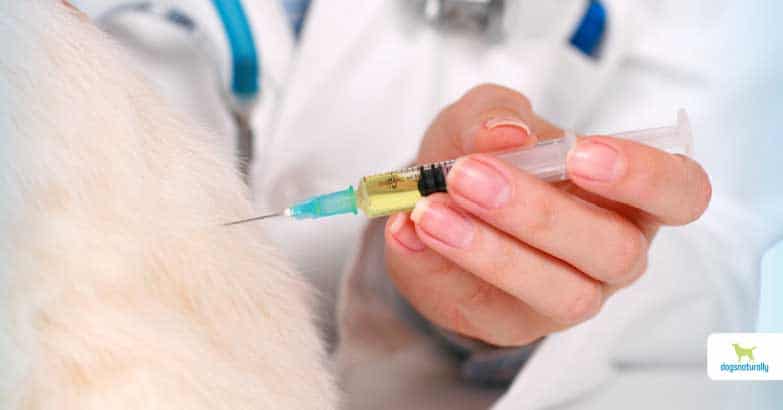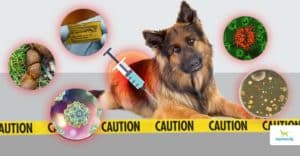If you get a new dog, sooner or later you’ll have a discussion with your vet about vaccines. And the main one your vet will push is a combination vaccine called DHPP.
If you bought a puppy, conventional vets will urge a series of DHPP shots, every 3-4 weeks from age 6 to 16 weeks. Your puppy’s breeder may even have given him the vaccine once or twice before you got him.
If you adopted a dog from a shelter or rescue, he’s probably received a DHPP vaccine (or more) “just in case.” In adult dogs this is usually unnecessary. But shelters do it anyway because they don’t understand how harmful it is to over-vaccinate.
And then, every year or 3 years after that, your vet will send you a reminder your dog needs his DHPP “boosters.”
Your vet may be well-intentioned … and may not even know any better. But actually, those boosters aren’t necessary. We’ll explain why in a bit. But first, what is the DHPP vaccine?
The DHPP Vaccine
DHPP is a combination vaccine that covers several diseases. This combination is considered a “core” vaccine. This means conventional vets will recommend it for ALL dogs, regardless of lifestyle. (Read on to find out if it’s really essential.)
Here’s what’s covered in the DHPP vaccine:
Distemper
Distemper is a serious virus. It spreads through direct contact or through airborne exposure like sneezing or coughing. Puppies can also get it through their mothers’ placenta.
Wild animals like raccoons, coyotes, skunks, foxes, or ferrets can also get distemper. Animals with distemper can shed the virus into the environment. But fortunately the virus doesn’t last long outside the host.
Early signs of distemper include …
- Fever
- Lack of appetite
- Nasal discharge
- Eye discharge
- Lethargy
- Breathing problems
- Gastrointestinal issues
After some time, dogs can develop neurological symptoms like …
- Muscle twitching
- Convulsions
- Salivation
- Circling
- Head tilt
- Involuntary eye movements
- Partial paralysis
- Seizures
Distemper symptoms can be confused with other diseases. But if your dog shows these symptoms, get him to your vet quickly. It’s a serious disease … that gets harder to treat if your dog is in a more advanced state and has neurological symptoms.
RELATED: What your vet doesn’t know about distemper …
Hepatitis (Adenovirus)
This disease has two names. Infectious canine hepatitis is caused by canine adenovirus.
Dogs can get infected through urine, feces or saliva from infected dogs. Dogs who’ve recovered from hepatitis can shed the virus in their urine for 6 months.
Signs of hepatitis infection include …
- Fever of 104 or more, lasting 1 to 6 days
- Increased heart rate
- Spontaneous bleeding
- Apathy
- Loss of appetite
- Thirst
- Eye inflammation, watery discharge
- Nose and mouth red or bruised-looking
The virus targets organs like blood vessel linings, liver, kidneys, spleen, lungs. Mortality is highest in very young dogs.
Again, go to your vet if you see these symptoms in your dog as the disease can be deadly. If your dog is ill enough to have blood loss, he may need transfusions.
Parainfluenza
Parainfluenza virus is in the DHPP vaccine. But parainfluenza vaccination isn’t really a “core” vaccine. So it’s the odd one out in the DHPP combo.
Parainfluenza is quite contagious … but it’s not usually a life-threatening disease. Along with the bacterium Bordetella bronchiseptica, it’s a virus that can cause kennel cough. It’s the dog version of a human cold. It’s transmitted mainly through air droplets. It’s more common in dense dog populations like shelters and kennels.
Symptoms of kennel cough (whether viral or bacterial) include …
- Dry hacking/honking cough
- Nasal discharge
- Lethargy
- Lack of appetite
It’s a lot like the human cold. And just like our colds, this ailment will usually go away on its own.
RELATED: Does your dog need the kennel cough vaccine?
Parvovirus
This is the big one. Parvo is a disease that terrifies most vets and puppy owners. It’s a highly contagious viral disease. And your vet will probably convince you your puppy will die of parvo if you don’t vaccinate him. Parvo is less common in adult dogs.
Your dog can catch parvo through contact with infected feces. Or he could get it from another dog or contact with a contaminated object.
Here are some symptoms of parvo …
- Bloody feces that smell very unpleasant
- Vomiting
- Dehydration
- Nausea
- Fever
- Fatigue
- Loss of appetite
- Abdominal pain
The main concern with parvo in a puppy is that they can dehydrate very quickly. So if you suspect parvo, it’s important to get a prompt diagnosis. Vets can do a snap test very quickly for you. If your puppy does have parvo, your vet will urge you to hospitalize him. It’s a complex and expensive treatment.
But you do have other options, as long as you have a good holistic practitioner to work with. With proper guidance and the right remedies, you can treat him at home. But don’t try it by yourself. Make sure you consult with your holistic vet, herbalist or homeopath.
Parvo is very scary (and can cost thousands of dollars to treat). So that might send you rushing to vaccinate your puppy. But statistics show that …
- Vaccinated puppies can get parvo
- When they do, their survival rates are lower than unvaccinated pups
RELATED: Everything you need to know about the parvovirus vaccine …
Other Combinations
You may also see other combination vaccines with even more letters. DHLPP, DHLPPC, DA2LPPC, 5-Way, 6-Way, 7-Way, 7 in 1 … I even found a 10-way when I was researching!
You should avoid all these combinations (more about avoiding combos later). But there’s one that deserves special mention – and that’s DHLPP!
Leptospirosis Vaccine
That extra extra “L” in DHLPP is for leptospirosis. Watch out for this one, because more and more vets seem to be giving it routinely. And leptospirosis vaccines should never be given without serious consideration.
Leptospirosis is a non-core vaccine. Many dogs will never be exposed to leptospirosis. And even if they are, it’s a vaccine that’s best avoided. It’s not very effective … and it’s very high risk, causing many different adverse reactions.
These reactions can be very serious … like seizures, kidney failure, mast cell disease, and even death. And leptospirosis vaccine risks increase when you give it in combination with other vaccines. So even if you do decide to vaccinate your dog for lepto, be sure to give it separately.
RELATED: Why the lepto vaccine doesn’t work …
Is DHPP Required?
It’s easy to get tricked by terminology. Most vets consider DHPP to be essential … so they’ll often tell you it’s “required.” But that’s very misleading … and a vet who says this isn’t being honest.
DHPP is not required by law. And it’s completely up to you whether you give your dog a DHPP vaccine … ever!
The only vaccine required by law in North America is rabies.
Some groomers, kennels, trainers or daycares may also tell you a current DHPP is “required.” But that just means they require it! I’ll talk later about how to get around these “requirements.”
RELATED: Which vaccines does your dog need …
DHPP Side Effects
Your vet will probably tell you the DHPP vaccine is perfectly safe for your dog and that she very rarely sees any adverse reactions. But that’s because conventional vets don’t recognize the long-term chronic diseases that vaccination causes.
In fact, any vaccine can cause a reaction in your dog. It could be something like …
- Allergic reaction – like a swollen face
- Swelling at the vaccine site
- Fever
- Lethargy
- Hives
- Vomiting
- Lack of appetite
- Difficulty breathing
But what’s more likely to happen is that vaccination can cause long-term issues in your dog. Just one vaccine can cause problems … but over-vaccination makes them much more likely.
Chronic Health Problems
Holistic vets recognize that these problems stem from vaccination. It’s not just the vaccination itself that causes the damage.
Vaccines contain many harmful adjuvants and preservatives. Vaccine ingredients disrupt your dog’s overall health. They can affect his immune system, his skin, digestive system, endocrine system, and joint health.
RELATED: Harmful ingredients in your dog’s vaccine …
Chronic problems that can be triggered by over-vaccination include:
- Allergies
- Skin problems
- Digestive issues
- Autoimmune disease
- Thyroid problems
- Joint disease
- Cancer
… and more. And these can happen months or even years after vaccination. That’s why conventional vets often don’t recognize the connection.
So never give your dog a vaccine mindlessly, or just because your vet says he needs it.
RELATED: Why vets don’t recognize vaccine reactions …
Does Your Dog Need The DHPP Vaccine?
Again, except for rabies, there’s no law that says you have to give your dog any vaccine. We won’t tell you not to vaccinate … because that’s a personal decision. But many people are making that choice.
Lots of dog owners nowadays recognize (or have experienced) the chronic problems that vaccination can cause. And it can happen with just one shot. So you can opt not to give your dog the DHPP Vaccine at all. With gradual exposure, your puppy will gain natural immunity from disease.
You can also consider using nosodes to help protect him. Nosodes are homeopathic remedies made from diseased tissue (I know, it sounds gross). They’re a gentle and safe way to give your puppy some added support.
RELATED: Homeopathic veterinarian Dr Dee Blanco explains some of your options …
So, does your dog really need to have a DHPP shot … or 4 or 5? First, let’s talk about puppies. They’re the ones getting horribly over-vaccinated by conventional protocols.
DHPP Vaccine For Puppies
Conventional vets view DHPP as indispensable for puppies. And they’ll recommend a series of 4 or 5 DHPP vaccines over about 10 weeks.
Most conventional vets follow the AAHA (American Animal Hospital Association) guidelines. They recommend DHPP vaccines starting as early as 6 weeks … then every 2-4 weeks until 16 or 18 weeks.
Why do puppies get so many shots? It’s because of maternal antibodies.
Maternal Antibodies
Antibodies from mother’s milk protect newborn puppies from disease. But these antibodies can also “block” the vaccine’s ability to create immunity.
Maternal antibodies wear off over time … but vets don’t know exactly when. So they vaccinate repeatedly. They’re trying to catch that window between the maternal antibodies wearing off … and your puppy being exposed to the viruses.
This means that if you follow your vet’s advice, your puppy will get many more DHPP vaccines than he actually needs. He could receive 4 or 5 vaccines, when he only needs one!
Lifetime Immunity From One Vaccine
Veterinary immunologist Ronald D Schultz PhD spent his career researching vaccines. He researched and understood the risks of over-vaccination. So his solution was to wait until your puppy is 16 weeks old, and give ONE parvovirus, distemper and adenovirus vaccine.
At 16 weeks, your puppy will no longer have the maternal antibodies. So there’s a very high likelihood the vaccine will effectively create disease immunity. And Dr Schultz’s research showed that this one vaccine at 16 weeks will usually create immunity for life.
Use Titers To Check Protection
And if you want to confirm your puppy’s vaccine “took” you can get a titer. Titers are blood tests that show whether your dog has antibodies to disease. Titers can be done at any age, but the best time is 3 weeks after vaccination.
According to Dr Schultz’s research, if your puppy has ANY positive titer at all, he is protected for life by the vaccine.
RELATED: What’s so risky about puppy shots …
DHPP Vaccine For Adults
Most vets recommend a DHPP booster one year after the puppy shots. And then they’ll want to repeat it every 3 years.
Some vets will even remind you annually that your dog’s due for DHPP. If you want your dog to have an annual checkup, that’s fine. But it doesn’t need to include a vaccine!
If your dog had a DHPP vaccine at 16 weeks or later (even as an adult), he’s likely protected for life by the shots he’s already had. As Dr Schultz’s work showed, your dog doesn’t need annual or even triennial DHPP shots.
If you adopt an adult from a shelter or rescue, they’ll proudly state that he’s up to date on vaccines. That’s because most of these organizations don’t know your dog’s vaccine history … so they vaccinate “just in case.” And usually that “just in case” vaccination was unnecessary.
Chances are, your new dog has already had the DHPP vaccine earlier in his life … so he didn’t need it again. In rare cases, you may be able to persuade a rescue to let you handle vaccination yourself. And then you have a choice. (And you have the same choice for your puppy when he grows up.)
You can choose not to vaccinate your adult dog. Or, if you’re concerned he’s protected … you can get titers that confirm it. If you get a positive titer, you know your dog’s protected and there’s no need to repeat the titer in later years.
Unfortunately, even vets who agree to titer (instead of vaccinating blindly), will usually recommend a titer every year or 3 years. That’s not necessary. I’ll explain why.
Don’t Repeat Titers
If your dog has had a positive titer once, don’t repeat the titers.
Titers measure circulating antibodies in the blood. But over time, the antibodies will “fall off.” That doesn’t mean your dog’s not protected. If your dog’s had a positive titer in the past, those antibodies will reappear to do their job any time he’s exposed to the disease.
RELATED: Titers: Are you wasting your money?
Only Vaccinate A Healthy Dog
Never allow your vet to vaccinate your dog if he isn’t 100% healthy!
That means no minor ailments, no skin conditions, no digestive problems or other chronic problems of any kind. Most vets conveniently forget about this fact. Vaccine labels carry a warning that they’re only to be given to healthy animals!
All too often, you hear stories about a dog going to the vet with something minor. Maybe diarrhea or a urinary tract infection. And the vet says “let’s give Rover his shots while he’s here.”
This is very risky. Don’t let it happen! It’s asking for trouble to vaccinate a sick dog … and your vet should know better!
And now, in case you do decide to vaccinate your dog (whatever age he is) …
Let’s talk about the risks of combination vaccines like DHPP.
Avoid Combination Vaccines
Even if you decide you want to give your dog the DHPP vaccine … don’t give this combo!
Holistic vets call these combination vaccines “whombo combos” … because they understand the risks. But conventional vets like the convenience of giving all the vaccines at once – and they don’t see the harm. But more is not better!
Your dog’s immune system knows how to handle exposure to a virus. But natural exposure comes one virus at a time … not 4 or 5 or more viruses at once. It’s a tremendous burden on your dog’s body to have to deal with this assault.
This is especially important for small dogs. And that includes puppies with undeveloped immune systems. They’re more likely to have adverse reactions than bigger dogs.
Split Up The Vaccines
So … don’t give the DHPP vaccine to your dog all at once. Ask your vet to split up the vaccines and give them 3 weeks apart.
You can get a single parvovirus vaccine. Distemper is usually combined with adenovirus. And you can probably skip parainfluenza … since it’s not a core vaccine.
If your vet resists, your best option is to buy the vaccines yourself. You may have to buy a whole case. But that expense helps protect your dog’s health. (Perhaps you can donate the extras to your vet for other dogs and be proud of the good deed you’ve done!)
How To Handle “Requirements”
If you don’t vaccinate … or you don’t vaccinate regularly, this issue could come up.
You may get businesses asking for proof of your dog’s vaccination. It might be your vet, groomer, trainer, doggie daycare or boarding facility.
Note: This isn’t about rabies. That’s a different issue because of the laws. But now you know DHPP isn’t legally required, and you’ve decided not to do it. So how do you handle these situations?
Here are some options …
Veterinarians
There are more and more stories about vets who refuse to treat unvaccinated pets. If this happens to you, look for a more holistically minded or integrative vet. Even if they’re not completely holistic, more vets nowadays will understand your concerns. Some may agree to work with your unvaccinated dog. Or they may accept titers instead.
It’s a really good idea to have a holistic vet anyway! Find one to work with. Otherwise, in an emergency, you could be stuck with a vet who insists on vaccinating your dog when he’s sick! If you don’t have a holistic vet locally, find one who’ll do remote consultations with you by phone. Check the directories at theavh.org and ahvma.org.
You do need a relationship with a local vet. Sometimes you’ll need a local vet for emergencies and hands-on exams. Seek out one who’ll accommodate your needs. Some vets have house call businesses. These vets should be less likely to insist on vaccination.
Always ask to have your dog’s file clearly labeled “No vaccines without owner’s permission.”
Boarding Or Daycare
You have a few options with these businesses.
- Find another provider: unless this is the only business in town, call around to find a provider who’s not seeking proof of vaccination.
- Offer to sign a waiver: many businesses are worried your dog will get sick on their premises. So see if they’ll let you waive their liability.
- Ask about titers: many businesses will accept titers in lieu of vaccination.
- Get in-home care: instead of boarding or daycare, have a dogsitter or walker come to your home. They shouldn’t have vaccine requirements
Groomer
Find a groomer who doesn’t require vaccines. Small boutique or holistic groomers are more likely not to push for vaccinations. Or, ask if they’ll accept titers. Or find a mobile groomer who’ll bring their van to your home. They shouldn’t have vaccine requirements.
Trainer
If you’re taking a group class, find a try offering titers in lieu of vaccine requirements. If you’re hiring a private trainer, ask them to come to your home or do training off their premises.
Sometimes you have to work a bit harder to find the right service providers. And that means they won’t push you to give your dog potentially harmful vaccinations.
DNM RECOMMENDS: Four Leaf Rover offers Protect, a daily soil-based pre- and probiotic with ingredients that help remove heavy metals and other contaminants. Buy Protect now >>
Whether you choose to give your dog a DHPP vaccine or not, remember there are ways to lower the risks to your dog. And that includes giving it only once, at the right time. There’s just no good reason to risk your dog’s health by over-vaccinating.
References
Buonavoglia C, Martella V. Canine respiratory viruses. Vet Res. 2007 Mar-Apr;38(2):355-73.
Buonavoglia C et al. Canine parvovirus vaccination and immunisation failures: Are we far from disease eradication? Veterinary Microbiology. 2020;247.
Schultz RD. Duration of immunity for canine and feline vaccines: A review. Veterinary Microbiology. 2006;117(1):75-9.
[Presentation to veterinarians ] Schultz RD. What everyone needs to know about canine and feline vaccination programs. 2008 Conference of the AHVMA.
[Article] Schultz RD. Dog vaccines may not be necessary. University of Wisconsin-Madison News. March 14 2003.














